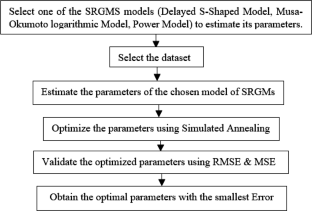The Journal of Supercomputing ( IF 3.3 ) Pub Date : 2024-04-09 , DOI: 10.1007/s11227-024-06046-4 Baydaa Sulaiman Bahnam , Suhair Abd Dawwod , Mohammed Chachan Younis

|
In artificial intelligence (AI), optimization techniques are used to solve several problems in different fields. One of these areas is software reliability verification, which is an important part of software products, as it helps determine how reliable the software is to complete its functions. This is done by estimating the parameters of software reliability growth models (SRGMs). SRGMs predict the expected number of failures after completion, while also serving as an indicator of software readiness for delivery. Therefore, this study aims to optimize the estimation of these parameters based on the available failure data using one of the stochastic optimization algorithms, the simulated annealing algorithm (SA) due to its power and effectiveness. Three SRGMs’ models are studied: delayed S-shaped, Musa-Okumoto logarithmic and Power models, to examine the feasibility of the proposed algorithm using five different data sets. The results were compared and analyzed with several algorithms: Particle swarm optimization (PSO), cuckoo search (CS), modify whale optimization algorithm (MWOA), S-shaped model with logistic TEF and social spider algorithm (SSA). A comparison was also made with recent SRGMs that do not rely on AI techniques. The results showed that the proposed algorithm based on SA outperformed all other methods in finding the optimal parameters.
中文翻译:

通过模拟退火算法优化软件可靠性增长模型:参数估计和性能分析
在人工智能(AI)中,优化技术被用来解决不同领域的多个问题。其中之一是软件可靠性验证,它是软件产品的重要组成部分,因为它有助于确定软件完成其功能的可靠性。这是通过估计软件可靠性增长模型 (SRGM) 的参数来完成的。 SRGM 预测完成后的预期故障数量,同时也作为软件交付准备情况的指标。因此,本研究旨在使用随机优化算法之一,即模拟退火算法(SA),因其强大的功能和有效性,基于可用的故障数据来优化这些参数的估计。研究了三种 SRGM 模型:延迟 S 形模型、Musa-Okumoto 对数模型和 Power 模型,以使用五个不同的数据集检验所提出算法的可行性。结果与几种算法进行了比较和分析:粒子群优化算法(PSO)、布谷鸟搜索算法(CS)、修改鲸鱼优化算法(MWOA)、带有Logistic TEF的S形模型和社交蜘蛛算法(SSA)。还与最近不依赖人工智能技术的 SRGM 进行了比较。结果表明,所提出的基于 SA 的算法在寻找最优参数方面优于所有其他方法。



























 京公网安备 11010802027423号
京公网安备 11010802027423号